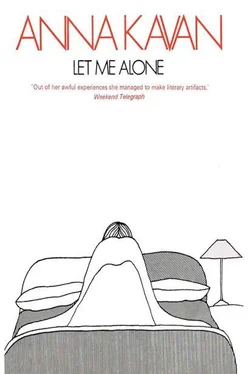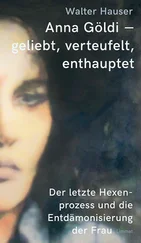The following days she saw a good deal of Kavan. Wherever she went about the house, he seemed always to be in the room with her, with his neat, round, dark head and his neat flannel suit, looking at her with an odd, friendly, complacent look. She got used to the sight of his head, a curiously inexpressive head, very round and smooth, almost ball-like, with the short, dark, stiff, rather dead-looking hair clinging so close, like a dark felt covering. It got in her eye, somehow, his head: so that wherever she looked she seemed to see it, the smooth, round, meaningless ball. It made her feel a trifle hysterical.
They played tennis together, and she was agreeably surprised. He really was a very good player, dashing about, somewhat lithe and monkeyish in spite of the stiff set of his shoulders. His long, brown, thin arms seemed to possess an enormous, monkeyish strength, as they swung up and down, and in his blue eyes an infallible judgment lurked, also somewhat simian. He wore his shirt decorously a little open, showing his neck brown right down to the chest; not with a sudden, hard, high-water mark of white, like the other men.
And he kept his attention fixed upon Anna during the game, so that — although he did not speak — she could feel the peculiar, indescribable exudation of his regard. Moreover, he picked up the balls for her when she was serving, and as he handed them to her, he looked, not at the balls on his outstretched racquet, but right into her eyes, with a very faint smile, as it were intimate, on his face. Anna did not know what to make of this. The man seemed to think that some private understanding had been established between them. She felt irritated, and also a little nervous. As though she would never be able to escape him.
Right enough, as she walked towards the house after the game, there was Matthew coming after her across the grass, quick march, with brisk, military steps, like a conscientious escort. She let him overtake her.
‘You played awfully well,’ he said, smiling, and looking self-satisfied, as though he took the credit for her proficiency.
Anna wanted to say something rude. But what, after all, was she to say? He smiled so innocently, as though he really did not know how irritating he was. And there was something rather winning about him; about his very unawareness.
They strolled on, through the pinkish tunnel of the rose-pergola, and out into the sun again. Anna looked at his brown, sinewy arms swinging in the sunshine, very smooth and hairless, but tough-looking, like leather, with a strange movement of muscles and tendons creeping and sliding inside the tough skin.
‘What strong arms you have!’ she exclaimed, almost involuntarily, looking down at them.
‘Yes. Look here!’
He laughed with self-satisfaction, clenching his fist and swinging up his forearm with a sharp jerk. The muscles swelled and knotted, creeping strips and bundles of contorted energy under the brown, leathery hide. He was childishly proud.
‘I can crack a hazel-nut in there — easily,’ he said, fingering the bulging curve where the upper arm pressed the forearm.
He laughed again, and came a little nearer to Anna, walking with a slight swagger.
‘Hadn’t you better pull your sleeves down?’ she asked, irritated and malicious.
‘Yes, I suppose I had.’
The rebuff slipped off him completely. He was quite unaware, rolling down his sleeves and walking prancingly along. Again she felt that faint, nervous sinking of the heart. He was so, so inhuman, somehow. It was quite impossible to reach him. And glancing at the smooth brown skin, so oddly hairless, blemishless, so like a strong, neat paper wrapping, she shuddered inwardly. But what was inside the parcel, and was there any way of getting in? That was her problem for the moment.
When they got to the bed of calceolarias, he stopped again.
‘But really, they are extraordinary, aren’t they?’ he said, allowing his arm to rest against her for the tiniest fraction of time. The flowers seemed to fascinate him in some way.
‘They say that witches used them in the practice of lycanthropy,’ she remarked, rather distant and superior.
He gave her a sharp, sideways look.
‘Lycanthropy? What is that?’ he asked.
‘You’ve heard of were-wolves?’
Her voice was supercilious and mocking. Rather to her surprise she felt a distinct desire to deride him, to make him feel small.
‘Were-wolves — yes, I’ve heard of them,’ he admitted slowly.
He gazed down at the evil-looking flowers that crowded the bed. Like lips they looked in the sunshine, angry, swollen, distorted lips mouthing at them in malevolent fashion.
‘You must be very clever. You know such a lot,’ he said, oddly humble and sincere.
He was not in the least offended by her sneering tone. Perhaps he had not noticed.
‘Oh, not so very,’ said Anna airily.
She laughed, feeling a little compunction, and walked on to the house beside him.
He was beginning to occupy her mind considerably. But what she felt about him was principally a dazed bewilderment, with the faint, creeping nervousness behind.
‘Who was talking to you out on the grass?’ Lauretta asked her, when she got indoors.
‘Matthew Kavan,’ Anna replied.
‘Oh,’ said Lauretta, eyeing her, and standing quite motionless. Then, suddenly, on a new note: ‘What do you think of him?’
‘He seems all right.’
Anna’s tone was non-committal. She was rather astonished at her aunt’s interest and amiability. It was long since there had been any friendly talk between them in private.
‘You seem to get on well with him,’ said Lauretta, watching her with her very quick eyes.
‘Yes, I suppose so,’ said Anna.
‘But you do, don’t you?’ insisted Lauretta. She stared at the girl, as if considering.
‘Yes,’ agreed Anna, to finish the conversation. The subject made her feel uneasy.
‘Well, I think he is a very pleasant young man,’ pronounced Lauretta.
Kavan continued to stop at Blue Hills. He had originally been invited for a week, but the invitation was extended. He clearly did not want to go away. But then he did not seem to have any special desire to remain, either. At any rate, he didn’t seem to have any object in view. A slightly unnatural situation was created by his continued presence. Heyward Bland had had enough of him. Anna was perplexed but apparently unconcerned. The young man himself continued amiable and obliging in his somewhat unreal fashion. It was now Lauretta who rather pressed him to stay.
Meanwhile, Matthew hung about the house. He was always ready to do anything or go anywhere, but Anna felt that he was always just behind her. She could not shake him off. With his peculiar soft determination he seemed to follow her about, from room to room. Upstairs or downstairs, indoors or out, his round, dark, dry-looking head would come gently bouncing along into her line of vision; and his thin, neat body, narrow like a grandfather clock with its rather stiff shoulders, would be everlastingly looming up at her; or moving along beside her with its slight, aggravating, self-satisfied prance. As the time went on, it began to get on her nerves.
Suddenly one evening he came into the drawing-room with a bunch of pale mauve violas in his hand. It was rather late, and the rest of the household was preparing for dinner. The complacent but rather winning smile brightened his face when he saw that Anna was alone — a neat, winsome, significant sort of smile.
‘I’ve just picked these flowers in the garden,’ he said at once, looking at her with the strange opaqueness in his blue eyes, as if he really did not see her at all. He was holding out the flowers for her to take.
‘But what are they for?’ asked Anna. ‘What do you want me to do with them?’
Читать дальше












